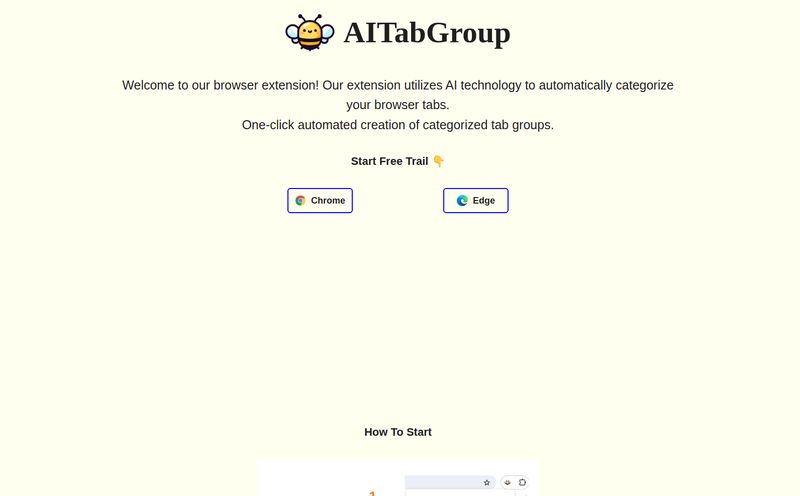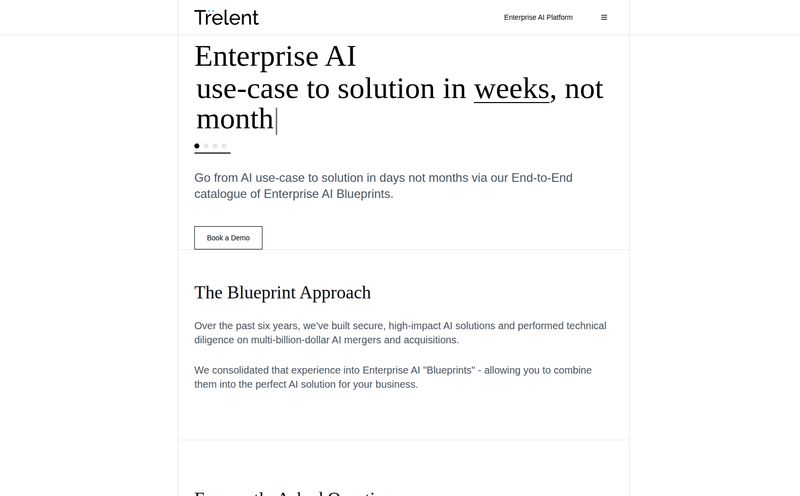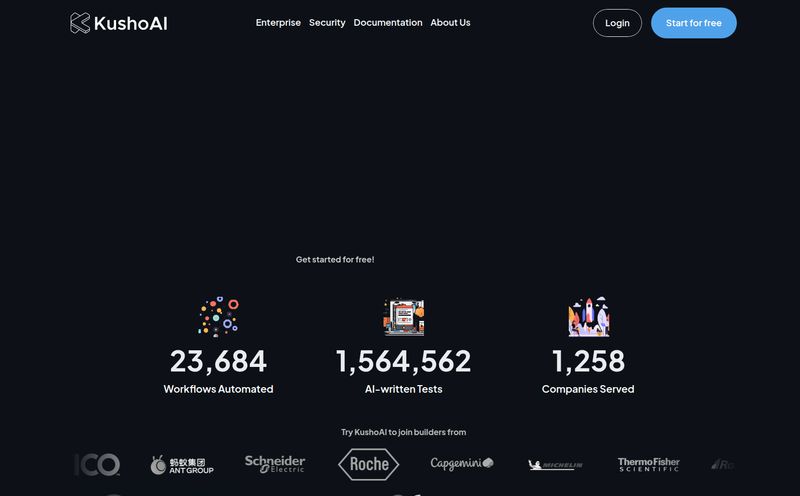If you’ve spent any time in the dev world over the past couple of years, you know the drill. The AI gold rush is on, and every week there’s a new, mind-blowing model that can write your code, design your logo, or probably even do your taxes (don't try that at home). It's exciting! But then comes the... implementation part.
Suddenly, you’re drowning in a sea of API keys. One for OpenAI, another for Anthropic, one for that cool new image generator, and each one has its own SDK, its own documentation (written in a completely different style, of course), and its own set of quirks. It's less 'cutting-edge tech innovator' and more 'frustrated 1950s switchboard operator,' constantly plugging and unplugging wires just to connect a call. I’ve been there, and frankly, it’s a drag. That’s the exact headache a platform like Every AI seems poised to cure.
So, What Exactly is Every AI?
On the surface, Every AI presents a simple, beautiful promise: a single, unified platform to integrate all sorts of different AI models into your websites and applications. Instead of juggling a dozen different APIs, you connect to one. Just one. It acts as a middle-man, a universal translator that speaks to all the other AIs on your behalf. Think of it like a universal remote for your home theater system. You don't need a remote for the TV, one for the soundbar, and another for the Blu-ray player. You just need the one that controls them all.
That's the vision. It aims to make AI development not just easier, but more accessible and scalable for, well, everyone. A bold claim, but one I'm definitely here for.

Visit Every AI
The Headache Every AI Wants to Cure
The Old Way: Juggling Keys and Endpoints
Let's get into the weeds for a second. If you wanted to build an app that uses GPT-4 for text and, say, Stable Diffusion for images, you'd traditionally need to:
- Sign up for developer accounts on both platforms.
- Generate and securely store two separate API keys.
- Install two different SDKs or libraries in your project.
- Read through two sets of documentation to understand how to format your requests, handle responses, and manage errors.
- Write separate code modules to handle the logic for each API call.
It's doable, sure. But it’s clunky. It adds overhead, complexity, and more points of failure. What if you want to swap one model for another? You're back to the drawing board, ripping out code and starting over. Not ideal for rapid prototyping.
The Every AI Promise: A Single, Unified Interface
Every AI steps in and says, “Hey, give all that mess to me.” You connect your application to Every AI's API. From there, you can supposedly call whichever model you need through their unified system. It's a powerful concept that abstracts away the most annoying parts of multi-model AI development. This could seriously speed up development cycles and lower the barrier to entry for developers who are curious about AI but intimidated by the ecosystem's fragmentation.
Digging into the Core Features
From what I've gathered, the platform rests on a few key pillars. First, they offer SDKs for multiple programming languages. This is table stakes, really, but crucial for being developer-friendly. Whether you're a Python person, a JavaScript junkie, or something else, they want to have you covered.
The unified interface is the star of the show, obviously. But another feature listed is AI model training capabilities. Now this is interesting. It's one thing to be a simple passthrough for other APIs, but allowing developers to train or fine-tune models through your platform adds a whole other layer of value. The details are a bit sparse here, but the potential is huge. Imagine fine-tuning a language model on your company's support documents directly through the same tool you use to serve it. Yes, please.
And of course, there’s extensive documentation. Any dev-focused tool that skimps on docs is dead on arrival, so it's good to see them highlighting this. A great tool with bad documentation is just a wierd paperweight.
Who is This Platform Actually For?
I’ve been mulling this over. Who gets the most out of a tool like this? A few profiles come to mind.
The Indie Hacker & Small Teams
If you're a solo developer or part of a tiny startup, your most valuable resource is time. You need to build, test, and iterate fast. The idea of integrating three different AI features in a weekend without wanting to pull your hair out is incredibly appealing. This is where Every AI could really shine, acting as a force multiplier for small, agile teams.
The Agency Folks
I can also see this being a hit with digital agencies. When you're building proofs-of-concept for clients or trying to quickly add AI-powered features to a client's website, you don't have time for a deep dive into five different API docs. A platform that lets you easily swap models to see which performs best for a specific use case would be a godsend.
Let's Talk Money: The $20 Question
Okay, pricing. This is where things get a little... vague. The offer I've seen is "$20 Access API + Free integration with your app (limited time offer)."
My take? For twenty bucks, it feels like a no-brainer to at least try it out. It's a flat, simple entry fee that removes the friction of a complex subscription model. I appreciate that. It's an impulse buy for any serious developer. The "limited time offer" for free integration help is a nice touch, showing they're hungry for early adopters and willing to provide hands-on support.
However, what happens after that initial access? Is there a per-call fee? Are there different tiers? The website doesn't make this clear, and when I tried to look for a pricing page... well, let's just say I was greeted with a friendly "The page you were looking for doesn't exist." A classic. Look, I get it, new platforms are a work in progress, but clear pricing is a matter of trust.
The Good, The Bad, and The... Missing Page?
What I Like (The Pros)
The core value proposition is fantastic. Simplifying AI integration is a genuine problem that needs solving. The developer-first approach with multi-language SDKs and a focus on documentation is the right way to go. It feels like a tool built by developers, for developers. For a small, one-time fee to get started, the risk is incredibly low.
Where It Gets a Bit Murky (The Cons)
My main hesitation comes from the unknowns. Which specific AI models can I actually access? Is it just the big names, or do they support smaller, open-source alternatives? The lack of this information makes it hard to gauge the platform's true power. And, as mentioned, the pricing model needs to be fleshed out. No one wants to build their app on a platform only to be hit with surprise costs later.
There's also the inherent risk of vendor lock-in. By building your app around Every AI, you're tying your fate to theirs. If they go down, or change their terms, your AI features could go down with them. It’s the classic trade-off between convenience and control.
My Final Take: Is Every AI Worth a Shot?
So, what's the verdict? Despite the missing pages and the slightly fuzzy details, I’m optimistic. Every AI is tackling a real, frustrating problem in a space that’s only getting more complicated. The concept of a universal remote for AI is not just cool; it's becoming necessary.
For $20, it feels like a very small price to pay for a lottery ticket that could save you hundreds of hours of development headaches. If you're an indie dev, a startup, or an agency looking to experiment with AI without the API-juggling nightmare, I think Every AI is absolutely worth a look. Go in with open eyes, be aware of the current gaps in information, but be ready to be pleasantly surprised.
I’m rooting for them. The industry needs solutions like this. Now if you'll excuse me, I'm going to check if they've fixed that pricing page yet.
Frequently Asked Questions about Every AI
- What is Every AI?
- Every AI is a development platform designed to simplify how you add artificial intelligence to your apps and websites. It provides a single, unified API and SDKs that connect to various AI models, so you don't have to manage multiple integrations yourself.
- How much does Every AI cost?
- Currently, they offer API access for a one-time fee of $20. This comes with a limited-time offer for free integration support. The long-term pricing model and any potential usage-based fees are not yet detailed on their site.
- What programming languages does it support?
- Every AI is built to be developer-friendly and offers Software Development Kits (SDKs) for multiple programming languages, though a definitive list isn't publicly available. The goal is to support popular languages used in web and app development.
- Can I train my own models with Every AI?
- The platform lists "AI model training capabilities" as a feature, which suggests that beyond just calling existing models, you may be able to fine-tune them with your own data. The specifics of this feature are still a bit unclear.
- Who is the ideal user for Every AI?
- It seems best suited for independent developers, startups, and agencies who need to prototype and build AI features quickly. It's for anyone who values speed and simplicity over managing every single API connection manually.
- Is it risky to rely on a platform like Every AI?
- There's always a trade-off. You gain immense convenience but also introduce a dependency on Every AI's platform. It's a form of vendor lock-in, so you're trusting them to maintain service and fair pricing. This is a common consideration with any third-party service integration.



